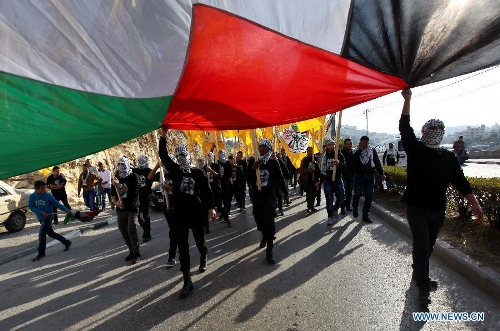Originally published by Ma’an News Agency on November 15, 2014.
Thousands marched in the streets of Bethlehem on Saturday to mark Palestinian Independence Day and the 10th anniversary of Palestinian leader Yasser Arafat’s death.
Palestinians marched through the main streets of the holy city waving Palestinian and Fatah flags. The march went from the governmental compound near Duheisha refugee camp past the city’s central Fatah office and then onward to the Nativity Church in the historic center.
The celebrations came on the 26th anniversary of the Palestinian declaration of independence, signed by the Palestinian National Council on Nov. 15, 1988.
In the document, Palestinian leaders led by Arafat declared the existence of a State of Palestine inside the 1967 borders and the State’s belief “in the settlement of international and regional disputes by peaceful means in accordance with the charter and resolutions of the United Nations.”
Heralded as a “historic compromise,” the move implied that Palestinians would agree to accept only 22 percent of historic Palestine in exchange for peace with Israel.
Although many feared the move would endanger the rights of millions of Palestinian refugees to return to their homes, others were optimistic that finally Palestinians would be represented on the world stage as an independent actor.
On the 26th anniversary of the treaty’s signing, the PLO said in a statement that despite the Palestinians’ historic move in 1988, in the years since Israel had failed to be a partner for peace.
“Israel responded by colonizing more of our land and entrenching its control over the occupied West Bank, including East Jerusalem, and the Gaza Strip. The possibility of a two-state solution is quickly fading away,” the statement read.
“The international community must now act decisively in order to salvage the two-state solution. The international community’s recognition of a State of Palestine on all of the territory occupied by Israel in 1967 would be an important first step.”
Although the declaration paved the way for years of popular struggle culminating in the historic Oslo Peace Accords with Israel, in the years following Israeli expansion and colonization of the West Bank and the Gaza Strip increasingly dimmed the prospect of a two-state solution.
According to the PLO, between 1989 and 2014, the number of Israeli settlers on Palestinian land soared from 189,900 to nearly 600,000. These settlements, meanwhile, are located between and around Palestinians towns and villages, making a contiguous state next to impossible.
“Israel’s complete lack of accountability for its actions has led to a culture of impunity that threatens to destroy the last hope for a two-state solution,” the PLO said in the statement.The declaration of independence — and the Oslo Accords that followed — did however pave the way for the establishment of the Palestinian Authority.

Throughout the 1990s and 2000s, Palestinian leaders sought to create the institutions of statehood despite the lack of an actual state, leading to the development of a security apparatus under US tutelage and a Palestinian bureaucracy.
While major Palestinian cities have boomed in the 26 years since “independence,” Israeli confiscation of land in border regions has continued unabated.Last year, the World Bank estimated that Israeli control over Area C — the 61 percent of the West Bank under full Israeli military control — costs the Palestinian economy around $3.4 billion annually, or more than one-third of the Palestinian Authority’s GDP.
In its Independence Day statement, however, the PLO struck an optimistic chord, reaching out for international solidarity to achieve the dream of a Palestinian state free of occupation denied since 1948.
“One effective step that the international community can take is to recognize the State of Palestine over the 1967 border with East Jerusalem as its capital and support Palestine’s diplomatic initiatives such as the UNSC resolution to put an end to the Israeli occupation as well as our access to international treaties and organizations. This will provide additional support to the two-state solution between Israel and Palestine while nullifying any Israeli attempt to change the status quo of the occupied State of Palestine,” the PLO said.
“The international community must ban all Israeli settlement products, divest from all companies involved directly or indirectly in the Israeli occupation and take all possible measures in order to hold Israel, the occupying power, accountable for its daily violations to Palestinian rights and international law.”